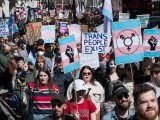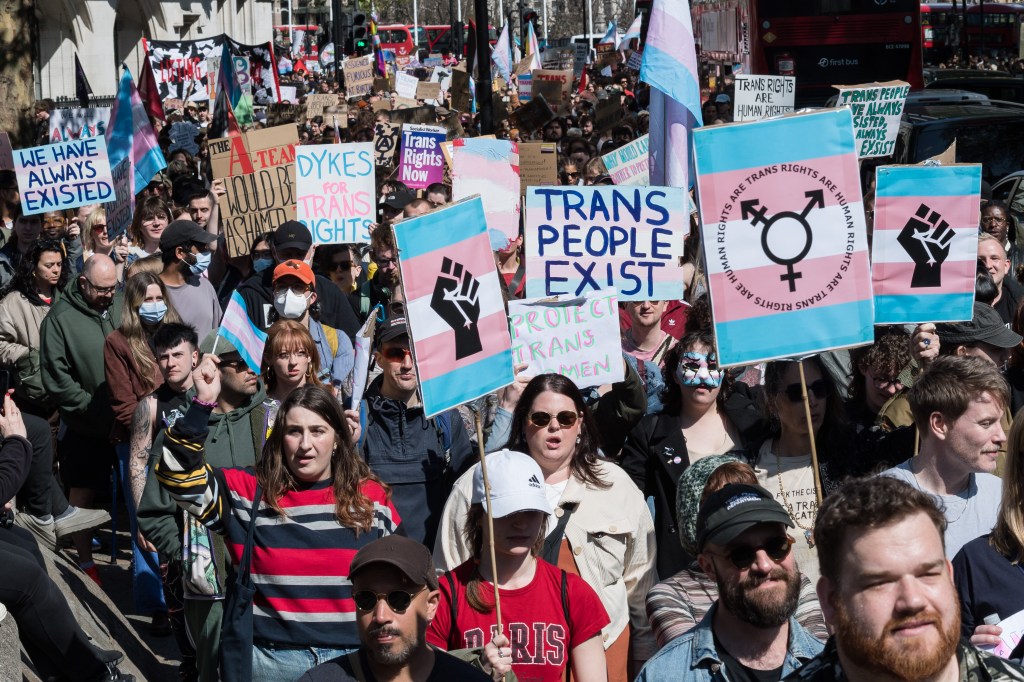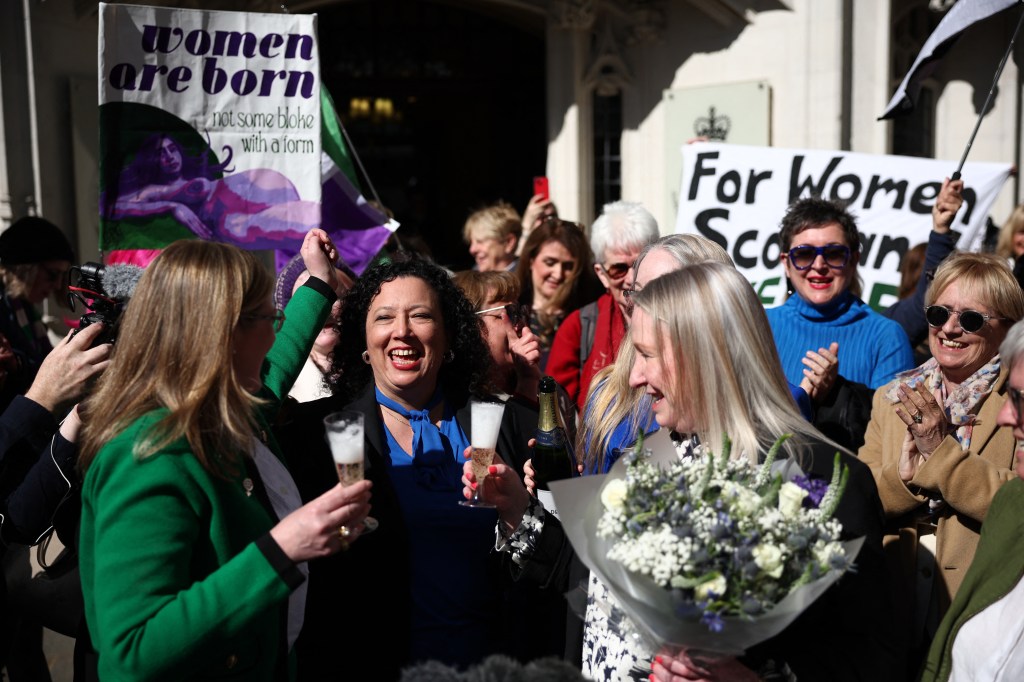 May 10 2025, 08:15
May 10 2025, 08:15 When the Supreme Court issued its 88-page long judgement that the legal definition of ‘sex’ is based on ‘biology’, gender critical lobbying group and controversially registered charity LGB Alliance declared it was a “landmark for lesbian rights in the UK”.
“This matters greatly to LGB people,” CEO Kate Barker said of the ruling. “It is especially important to lesbians, because the definition of lesbian is directly linked to the definition of woman.”
Barker – who once claimed a singular drag queen carrying the Olympic torch demonstrated the “erasure of woman in all spheres of public life” – went on to say the ruling “marks a watershed for women and, in particular, lesbians who have seen their rights and identities undermined over the last decade”.
Despite Supreme Court judge Lord Hodge specifically counseling against certain factions “reading this judgement as a triumph of one or more groups in our society at the expense of another,” gender critical activists view the outcome of the Supreme Court case as a decisive victory for all women over so-called ‘gender ideology’.
However, in the days and weeks that have followed the Supreme Court ruling, it has quickly become clear that many women who are not trans – who are in the court’s definition born as ‘biological women’, identify as women and women and live their lives as women – will likely be disadvantaged by the court’s decision because they do not fit into narrow, often white and western, definitions of what constitutes as ‘woman’.

Sparked by a trans-inclusive definition of womanhood in Gender Representation on Public Boards (Scotland) Act 2018 – which sought to diversity the number of women on public boards in the devolved nation – the Supreme Court decision was the culmination of a years-long legal battle between gender critical Scottish group For Women Scotland (FWS) and the Scottish government about how the protected characteristic of ‘sex’ is defined and applied in the 2010 Equality Act.
After traversing many different appeal processes, the case finally ended at the UK’s highest court and concluded the definition does not include trans people.
“The unanimous decision of this court is that the terms woman and sex in the Equality Act 2010 refer to a biological woman and biological sex,” Lord Hodge said in his oral reading of the ruling.
The decision is expected to have wide-ranging implications for the trans community, as well as organisations, public bodies and services who may be forced to update their policies on single-sex spaces, inclusion and discrimination. Some, including the Football Association and the England and Wales Cricket Board, have already taken steps to bar trans women from taking part in female matches.
In the wake of the ruling, the Equality and Human Rights Commission (EHRC) – the UK’s equalities watchdog – issued interim guidance which said single-sex spaces must be based on biology whereby a trans woman must not be allowed to use a female toilet and a trans man not allowed to use a male one. However, the guidance also adds that, in “some circumstances,” trans women should also be banned from the men’s facilities and trans men from women’s facilities.
When asked to clarify this point by the BBC, the EHRC directed the broadcaster to a section of the Supreme Court ruling which states trans men could be excluded from women’s facilities “where reasonable objection is taken to their presence, for example because the gender reassignment process has given them a masculine appearance or attributes to which reasonable objection might be taken” in the context of a female-only space, such as a toilet.
In essence, when a trans man looks, well, too much like a man (because he is one) or when a trans woman looks, well, too much like a woman (because she is one), they can be totally excluded from gendered spaces and be forced to only use a unisex facility – assuming one is available.
If the circumstances which would see trans men – who are defined by the court ruling as ‘biologically female’ – banned from female toilets is all about ‘masculine appearance’, then where does this leave masculine, cis women?

Whilst the Supreme Court case is supposedly about ‘protecting’ the interests of all women, this exception – in itself – shows there is only interest in protecting certain kinds of women. Namely, women who ‘look’ like women: traditionally feminine women with long hair, hips and visible breasts, who dress and talk and walk in a way that is ‘expected’ of women and who have no trouble moving through the world as one.
By contrast, there are plenty of other women out there who constantly have their gender and presentation policed by strangers for not fitting into the narrow and misogynistic definitions of what a woman should be. Women who are tall, have short hair, broad shoulders and square jawlines. Women who wear clothes from the men’s section and have deep voices and body hair. Women who are “incorrectly female,” Hannah Gadsby famously said.
Writing for Refinery29 in 2022, Yassine Senghor exemplifies this as “a dark-skinned Black, fat, masculine-presenting dyke with a shaved head who tends to lean towards clothing gendered as men’s” and said she has always been told she is “doing ‘woman’ wrong”. Similarly, in a different article for the publication, architect Martha said she has been made to feel that she is “failing at womanhood” and even when she presented more femininely was questioned about her gender.
Such slim definitions of what is correct or incorrect womanhood rooted in patriarchal beauty standards are – ironically enough – what feminists have actually spent decades fighting against, so that women have the choice about whether or not they want to shave their legs, wear make-up or put on dresses or *gasp* trousers.
The Supreme Court ruling will, very likely, cause butch and masculine lesbians to face increased harassment in single-sex female spaces simply because of how they present themselves. This is not a fictitious, dystopian musing by one dyke about the rights of others in her community, this is something we have already seen – and are continuing to see – when it comes to women do not fit into the confindes of traditional femininity and gender.
For Lesbian Visibility Week, which came a week after the Supreme Court’s decision, Labour MP Kate Osborne said she is “frequently misgendered” because of how she looks and expressed concern it will only get worse going forward.
“I note that Ministers said yesterday that there will be guidance regarding the Supreme Court verdict. That decision will have a huge impact on my life, on many other cis lesbians and, indeed, on heterosexual women,” Osborne told fellow MPs. “I suspect that I will get challenged even more now when accessing facilities. The impact on my life will be problematic, but the impact on my trans siblings’ lives will be significantly worse.”
@pinknews A lesbian has been kicked out the women’s toilets in a posh Boston hotel for being “a man”, and told to “prove her gender”. Cisgender woman Ansley Baker was staying at the Liberty Hotel in upmarket Beacon Hill, with her girlfriend, Liz Victor, when the incident occurred on Saturday afternoon (3 May). Both had booked in as part of a party watching the Kentucky Derby, and were using the female toilet when a male security guard began banging on the stall doors, they claimed. “One of the security guards was there telling me to get out of the bathroom, telling me I am a man in the women’s bathroom. I told him I was a woman,” CBS News reported Baker saying. Baker claimed she was removed before she had a chance to finish tying her shorts, which was “humiliating”, and was accused of not being a woman by others as she was escorted past them as they waited in line to use the toilets. “Someone said: ‘Get him out of here… he’s a creep’, referring to me,” she said. The security guard then checked their IDs and the situation became heated, resulting in the two women being asked to leave the hotel – part of the Marriott Bonvoy rewards programme – altogether. In an initial statement issued on Monday (5 May), a spokesperson for the hotel accused the pair of sharing a stall. “An incident occurred at the Liberty Hotel on Saturday, where several women alerted security of two adults sharing a bathroom stall,” they said. “The bathroom was cleared out as two adults in one stall are not permitted. After leaving the bathroom, a member of the couple from the stall put their hands on our security team and it was then that they were removed from the premises. “The Liberty has a zero-tolerance policy for any physical altercations on our property. The safety of our guests and staff is our priority, and this event is under investigation.” The women deny sharing a stall, with Victor saying: “If that’s what he thought the issue was, once he opened the stall door, obviously there was only one person in there, so it should’ve been case closed. Let her tie up her shorts and go about her day.” Following an internal investigation, the hotel said the security guard had been suspended from his role and all staff were being retrained “on inclusive practices and guest interaction protocols”. A spokesperson said: “The Liberty Hotel is, and always will, be an ally of the LGBTQ+ community and a place where everyone is welcome and celebrated. “We will continue to educate and train our team, to ensure that everyone feels safe and accepted within our four walls, and guests who do not show tolerance and acceptance towards others will be removed.” The hotel will be making a donation to a local LGBTQ+ organisation. In 2018, the partner of Jessica Walton, the author of trans-inclusive children’s book, such as Introducing Teddy, was “aggressively told her to leave” a bowling alley by a security guard after she used the women’s toilets. In 2021, poet Eloise Stonborough spoke of the number of times she has been questioned when using female facilities, estimating that she has been challenged roughly every one in three visits. More recently, MPs have expressed concern about how last month’s ruling by the UK Supreme Court, which deemed that the protected characteristic of “s3x” in the 2010 Equality Act referred only to “biological women” – and, by consequence that access to single-s3x spaces should be based on biology – would affect lesbian women who do not fit the traditional ideals of femininity and womanhood. MP Dawn Butler told the House of Commons that she had witnessed “butch lesbian” friends being questioned in the women’s toilets. Fellow Labour MP and lesbian Kate Osborne said she is often questioned about her gender and was worried that the court verdict would only make it worse. #lesbian #lgbtqia #transgender #toilet #usnews #boston
♬ Minimal for news / news suspense(1169746) – Hiraoka Kotaro
Just this week, across the pond, in the United States, a number of headlines were dedicated to an incident involving lesbian woman Ansley Baker who was removed from a female toilet in a Boston hotel by a male security guard after being accused of being ‘a man’ by other women in the facility. The irony that it was a male security guard who banged on the cubical door and removed her when her shorts were not fully done up has not been lost on most in the LGBTQ+ community, it must be noted.
Baker is certainly not the first, nor will she likely be the last, lesbian to face such treatment, with other incidents from recent years including the partner of children’s author Jessica Walton and poet Eloise Stonborough, whilst Martha told R29 she has “some kind of confrontation or experience in a public bathroom every few months” after starting to present in a more butch way.
But, tight confines and strict parameters of what constitutes correct womanliness and the social punishments inflicted when broken are not solely restricted to masculine lesbians, straight women too have subject to such policing.
In 2023, the pregnant girlfriend of Harry Potter star Daniel Radcliffe, The Marvelous Mrs. Maisel actor Erin Darke, was transvestigated by anti-trans pundits on social media because she happens to be taller than Radcliffe and have certain facial features. Transvesigation refers to conspiracy theories that falsely claim individuals, typically women, are transgender and are hiding their “true” gender identity, with Drake accused of ‘secretly being trans’. Transvesitigations are entirely rooted in warped, deeply misogynistic and racist, views of femininity and gender.
Similarly, Olympic boxer Imane Khelif – who was thrust into the centre of a gender storm during the Paris Games – was accused of ‘being a man’ despite the fact she, and Olympic bosses, clarified she is not nor has ever identified as trans. In fact in Algeria, where Khelif hails from, gender-affirming care is banned and public gender non-conformity has the potential to be prosecuted as “indecent” under the 1966 penal code. However, people failed to engage the grey matter in their brains and the conspiracy persisted because, according to the wisdom of users on X/Twitter, Khelif has a strong nose, muscles, is tall and has hairs on her knuckles, so must be male.
Other cis women who are seemingly not woman enough according to transphobes include rugby icon Ilona Maher, tennis legend Serena Williams and former first lady Michelle Obama. Why? Again, because their bodies have dared to exist outside of patriarchal beauty standards, defined and controlled by the the male gaze.

As organisations, public bodies and services across the UK look set to draw up fresh guidelines in response to the Supreme Court ruling we will all do well to remember that gender policing does far, far more harm than ever does any good. At best it can be an irritant for women who move through the world everyday in a more masculine presentation, at its worst it poses an inherent threat to the people such an ill-thought out ruling is supposed to protect; putting woman who do not conform at risk of harassment, abuse and vigliante justice.
As Hannah Gadsby explained when she described herself as being ‘incorrectly female’, she was beaten up for being visibly lesbian and accepted that was what she was worth, because that is what the world told her.
“He beat the shit out of me and nobody stopped him. And I didn’t report that to the police and I did not take myself to the hospital and I should have. And you know why I didn’t? Because I thought that is all I was worth,” she explained during her stand up show Nanette. “And that was not homophobia pure and simple, people, that was gendered. If I’d have been feminine, that would not have happened. I am incorrectly female, I am incorrect, and that is a punishable offence.”
At its heart gender policing just proves – just like their views on the beautiful diversity of gender are narrow – the views of bigots on womanhood are equally as restrictive.
The post Gender policing does not ‘protect’ butch women and lesbians – it actively punishes them appeared first on PinkNews | Latest lesbian, gay, bi and trans news | LGBTQ+ news.